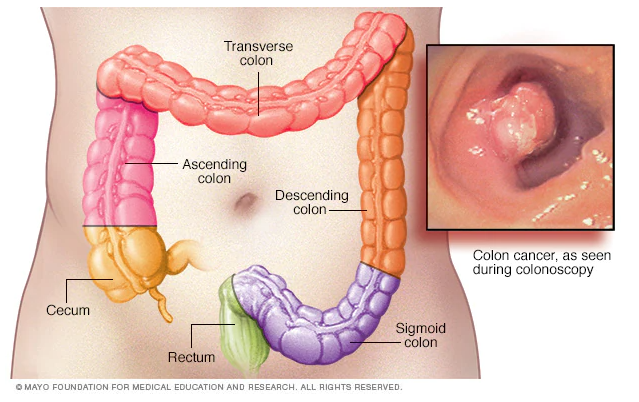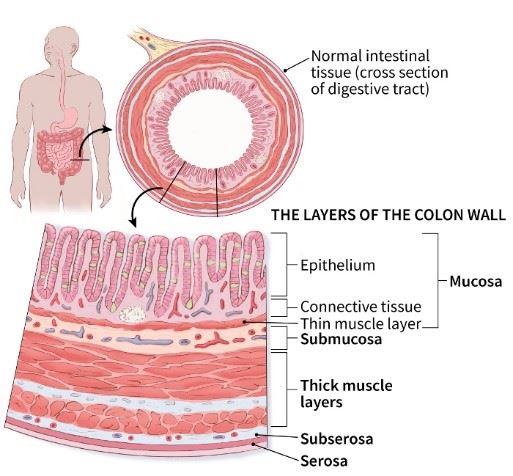The Cancer That Can Be Prevented
- Posted On:
- Written By: Cydney Shriver

Colorectal Cancer, or Colon Cancer, is the third most common cancer diagnosed in both men and women in the United States, with the lifetime risk is about 1 in 23 for men and 1 in 26 for women. Colon cancer doesn’t get the same attention as some higher-profile cancers, but it should! The most important fact about colon cancer is that it can be prevented.
What is Colon Cancer?
 |
The largest part of the large intestine is called the colon and is the last part of the digestive system which is where food is broken downs for the body to use. The large intestine is about 5 feet long and are named by which way the food is traveling through them; ascending colon, transverse colon, descending colon, and sigmoid colon. The ascending and transverse sections together are called the proximal colon and the descending and sigmoid colon are called the distal colon. This is where colon cancer begins.
Colon Cancer usually begins as small clumps of cells called polyps that form inside the colon. Polyps normally don’t start out as cancerous, but may turn into colon cancers over time. For this reason, men and women are recommended to have screening tests to look for polyps in the colon normally beginning at age 45. This age can be earlier for any person’s more at risk for colon cancer.
Symptoms of Colon Cancer
When a person starts developing polyps, they won’t have any symptoms at first. When symptoms do appear, they’ll likely depend on the cancer’s size and where it is located in the large intestine. Some symptoms of colon cancer include:
- A change in bowel habits, such as diarrhea, constipation, or narrowing of the stool, that lasts for more than a few days
- A feeling that you need to have a bowel movement that is not relieved by having one
- Rectal bleeding with bright red blood
- Blood in the stool, which might make it look dark brown or black
- Cramping or abdominal (belly) pain
- Weakness and fatigue
- Losing weight without trying
Often colorectal cancer doesn’t cause symptoms until it has grown or spread. That’s why it’s best to be tested for colorectal cancer before ever having any symptoms.
How Colon Cancer Spreads
The wall of the large intestine, or colon, is made up of many layers, and colon cancer begins in the innermost layer. When cancer cells are in the wall of the intestine, they can then grow into blood vessels and travel to nearby lymph nodes or to distant parts of the body.

The stage of colon cancer a person is diagnosed depends on how deeply it grows into the wall and if it has spread outside of the colon.
Importance of Screening + Testing
People with average risk of colon cancer are recommended to begin colon cancer screenings around the age of 45. If you are someone with an increased risk, please speak with your healthcare provider about beginning screenings earlier. Anyone over the age of 75 should talk to a doctor about screening options. There are a variety of options for colon cancer screenings, these include:
- Colonoscopy: this test uses a small flexible tube with a camera at the end to examine the full length of the inside of the colon. If the exam finds polyps or other suspicious growths, they can be removed during the test.
- A certified provider performs this exam.
- These are only needed to be performed every 10 years, if no polyps or other suspicious growths are found. If polyps or suspicious growths are found, the screening is suggested more frequently (3-5 years).
- Home Stool Tests: these tests are quick and easy. You collect a sample of your stool at home, and it is then sent to a lab to be tested.
- These are only needed to be performed every three years.
- CT Colonography (Virtual Colonoscopy): This is a computer tomography (CT) which uses x-rays and computers to produce images of the entire colon, which are displayed on a computer screen for the doctor to analyze.
- These are only needed to be performed every five years.
Who Performs a Colonoscopy at Myrtue Medical Center?
Here in Harlan, we are lucky to have three qualified professionals who perform colonoscopies for patients:
- Dr. LeRoy Hodges, Myrtue’s General Surgeon
- Dr. Brian Anderson, Family Practice Physician
- Dr. Alexander Bernal, Myrtue’s Surgery + Specialty Clinic Gastroenterologist who visits Harlan from the Midwest Gastrointestinal Associates out of Omaha
Colon Cancer is very common, but also very preventable! To schedule an appointment with your primary care physician to start the conversation about your options for colon cancer screenings, give us a call at 712.755.4516. Myrtue Medical Center is here to provide you with quality care close to home.
Today and every day, we support the fighters, admire the survivors, honor the taken, and never, ever give up!

